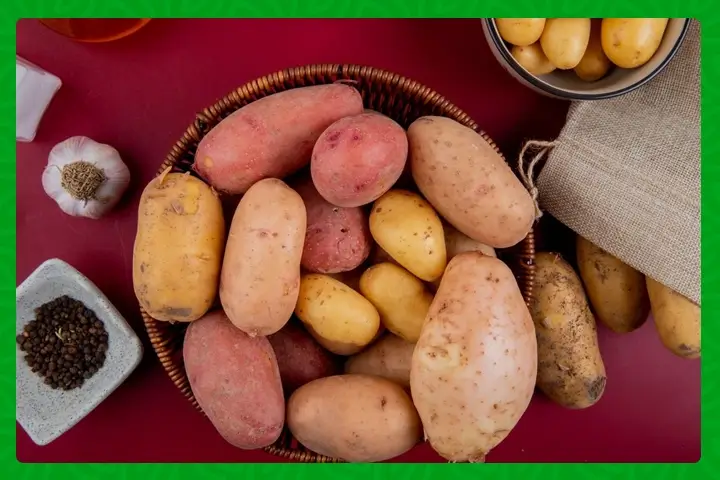
Written by Anil M V, 24 years experience, {Bsc. Agric, MBA, CTP}Founder, Organil Services
In the world of nutrition, few topics spark as much debate as the role of carbohydrates, especially when it comes to managing conditions like diabetes. Among the many options available, sweet potatoes and regular potatoes stand out for their versatility and nutritional profiles. But when it comes to catering to the needs of individuals with diabetes, which tuber reigns supreme? Let’s delve into the sweet and starchy world of sweet potatoes and regular potatoes to unravel their impact on diabetic well-being.
Sweet potatoes and ordinary potatoes (white potatoes) have different nutritional profiles, which can impact their effects on blood sugar levels in diabetic individuals.

Understanding Diabetes and Dietary Choices:
Diabetes, a chronic condition characterized by elevated blood sugar levels, requires careful management, particularly through diet. For individuals with diabetes, monitoring carbohydrate intake is crucial for controlling blood sugar levels and reducing the risk of complications. In this context, the glycemic index (GI) plays a pivotal role. Foods with a lower GI are digested and absorbed more slowly, causing a gradual rise in blood sugar levels, which is favorable for diabetic individuals.

Sweet Potatoes: A Nutritional Powerhouse:
Sweet potatoes, with their vibrant orange hue, have long been hailed as a nutritional superstar. Rich in fiber, vitamins, and minerals, sweet potatoes offer a range of health benefits. Despite their natural sweetness, sweet potatoes have a relatively low GI compared to regular potatoes, making them a favorable choice for individuals with diabetes. Additionally, sweet potatoes contain beta-carotene, a potent antioxidant that supports eye health and overall immunity.
Regular Potatoes: Unraveling the Starch Story:
Regular potatoes, a dietary staple in many cultures, provide a hearty dose of carbohydrates. However, their impact on blood sugar levels is where the debate intensifies. While regular potatoes boast essential nutrients like potassium and vitamin C, they have a higher GI compared to sweet potatoes. This means that they can cause a more rapid spike in blood sugar levels, which may not be ideal for individuals with diabetes, especially when consumed in large quantities or in processed forms like fries or chips.

Here are some key specific analogy between sweet potatoes and ordinary potatoes, along with their potential implications for people with diabetes:
1. Carbohydrate Content:
– Sweet Potatoes: Sweet potatoes have a lower glycemic index (GI) compared to white potatoes. The glycemic index is a measure of how quickly a carbohydrate-containing food raises blood glucose levels. Sweet potatoes contain complex carbohydrates and dietary fiber, which help slow down the release of sugar into the bloodstream.
– Ordinary Potatoes: White potatoes have a higher glycemic index than sweet potatoes. They are rich in starch, which can cause a more rapid increase in blood glucose levels.
2. Fiber Content:
– Sweet Potatoes: Sweet potatoes are a good source of dietary fiber, which aids in digestion and helps regulate blood sugar levels by slowing down the absorption of sugars.
– Ordinary Potatoes: While white potatoes also contain some fiber, they generally have less fiber than sweet potatoes.
3. Nutrient Profile:
– Sweet Potatoes: Sweet potatoes are rich in vitamins and minerals, particularly beta-carotene (a precursor of vitamin A), vitamin C, and potassium. They also contain antioxidants that may have potential health benefits.
– Ordinary Potatoes: White potatoes also provide essential nutrients such as potassium and vitamin C, but they are not as rich in antioxidants as sweet potatoes.
4. Cooking Method:
– Both sweet potatoes and ordinary potatoes can have varying effects on blood sugar levels depending on the cooking method. Boiling or baking is generally recommended over frying, as frying can increase the glycemic index of potatoes.
For people with diabetes, managing blood sugar levels is essential. Sweet potatoes, due to their lower glycemic index and higher fiber content, may have a milder impact on blood glucose levels compared to ordinary potatoes. However, individual responses to different foods can vary, and it is essential for people with diabetes to monitor their blood sugar levels regularly and work with a registered dietitian or healthcare provider to create a personalized meal plan that fits their specific dietary needs and health goals.
Making Informed Choices:
When it comes to incorporating sweet potatoes and regular potatoes into a diabetic-friendly diet, moderation and mindful choices are key. Both tubers can be part of a balanced meal plan, but portion control and preparation methods matter. Opting for boiled or roasted sweet potatoes instead of fried options helps mitigate their impact on blood sugar levels. Similarly, choosing smaller portions of regular potatoes and pairing them with protein and fiber-rich foods can help slow down their digestion and absorption, reducing the risk of blood sugar spikes.
As with any dietary change, moderation is key. Portion control and mindful eating are crucial aspects of managing blood sugar levels for individuals with diabetes.
Aforesaid information delves that Sweet potato versus regular potato debate, there’s no one-size-fits-all answer. While both tubers offer nutritional benefits, their impact on blood sugar levels varies. For individuals with diabetes, sweet potatoes emerge as the preferred choice due to their lower GI and rich nutrient profile. However, regular potatoes can still be enjoyed in moderation, especially when prepared thoughtfully. Ultimately, a balanced approach to carbohydrate intake, coupled with regular monitoring of blood sugar levels, is essential for managing diabetes and promoting overall well-being.
Stay updated with the latest farming tips and agriculture industry news from Africa by subscribing to our newsletter. Don’t miss out on valuable insights and updates. Follow us on Twitter, LinkedIn, and Facebook to join our farming community and stay connected with us.



















